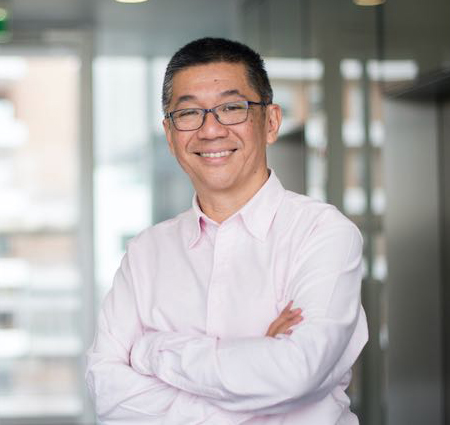
David Huang is a laboratory head working in the Blood Cells and Blood Cancer Division at WEHI. He is studying the proteins that are important for regulating cell death, and worked on some of the first drugs that mimic these proteins in order to fight cancer. 2021 will be David’s first Cancer Council Relay.
What do you do?
I’m a basic researcher working on cancers, so my job is really trying to use the best scientific tools that we have to discover why people suffer from cancer, and more importantly to use that knowledge to discover new ways to treat cancers. That’s my job.
Are there any particular cancers you focus on?
I’m interested in cancers very broadly, but our research is almost entirely focused around blood cancers. The reason I focus on blood cancers is that when I was a young doctor, the idea that you could look at a patient, and then actually look at the cancer cells and do experiments with these cells just amazed me. That’s what drew me into blood cancers because you can do a lot more than you can do with other cancers. You can study them in much greater detail.
One thing that got me interested in blood cancers was that I looked after a patient who was a young woman from New Zealand, who was working as an au pair in England. She came into hospital having been perfectly well, just feeling a little under the weather, and she was diagnosed with a blood cancer and she didn’t do very well. And nowadays, with that blood cancer, the patient just takes a pill and the chances of surviving more than 5 years is greater than 98% – and that’s because people were able to do research on that type of blood cancer. So that’s a motivating factor!
What made you move from working as a doctor to full time research?
I think I realized that what I really enjoyed doing being able to study diseases in much greater depth. I’ve always been very curious about why diseases happen, and most of the time when you are a doctor you’re curious but you actually don’t have enough time to explore that curiosity. So I’m really lucky that the taxpayer is prepared to pay for me to indulge in my hobby, as it were, and that I’m allowed to do that! And in addition to that I’m also very lucky because I am able to use my knowledge of patients, of the clinical world, in order to do my research. I think that’s been very, very useful.
A question here from Selena, who is 11: Did you change some of your habits due to learning more about science?
Definitely. I think, in some ways when you study a disease like cancer one of the things you think about is all those things that might cause you cancer, and so you change your habits.
But I think to me, the most important thing about doing research is not so much what’s been discovered through research. To me the most important thing is that if you are curious about something, if you are passionate about something, you should always try to see if you can work in that area. A lot of us end up doing jobs just to pay the bills, but I think if you are really interested in something, you should try to push that interest. And that can be in any branch of science, and you can make a contribution back to the community that way. So my habit from science is just instead of falling into a routine, to ask lots of questions. I think that’s what I’ve learned.
Were you always interested in science and biology?
I was actually very interested in maths, but my maths just wasn’t good enough. To have a career there, you have to be really good. I then got really interested in biology, because I started reading about Gregor Mendel. Mendel was a monk and he studied peas, and he actually laid down the foundations of genetics. A lot of that was based on his mathematical analysis, and that’s where I linked the love of maths with a love of science. And so maths skills I use now are very rudimentary, and I’m much more interested in genetics, because the main power of genetics is the variation it can create – really huge differences just from really small changes to genes – which is probably one of the most important things in biology.
Helena (8) wants to know: What is your greatest discovery?
A lot of scientists get asked that, or we get asked what was that ‘Eureka!’ moment. There are many things you enjoy day to day, and of course many frustrations.
I think the biggest and probably the luckiest discovery was that when I was a young scientist here, we discovered a molecule called Bim. The reason it was very important is that because cells live and die, and when this gets out of balance, you can get all sorts of problems, like cancer. And Bim turned out to be a very important protein that starts the process of cell death. In many ways, all our subsequent work came because of the discovery of Bim, so I think that was probably the most important discovery.
Why do you participate in the Relay?
The reason I’m really interested in participating in the Relay is that it’s something I can do with my colleagues, and with a lot of other people. The Relay is about sharing with the community and giving back to the researchers. I’m part of the community as well as benefiting from the research, so it’s really about that sense of belonging for me.
Want to support David in the Relay for Life? You can donate to his fundraising page here!
